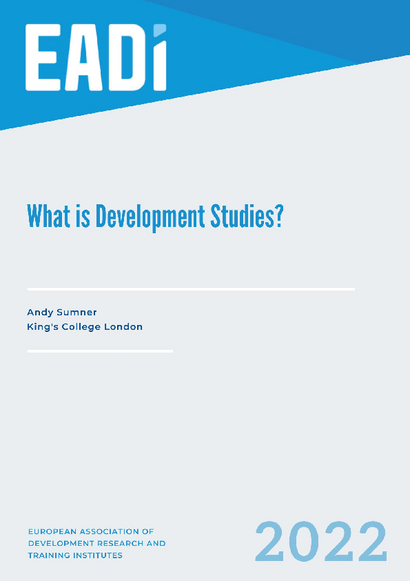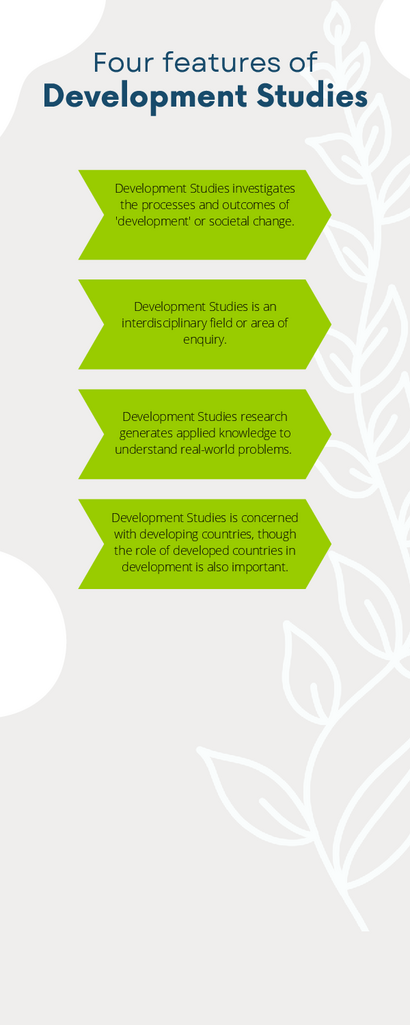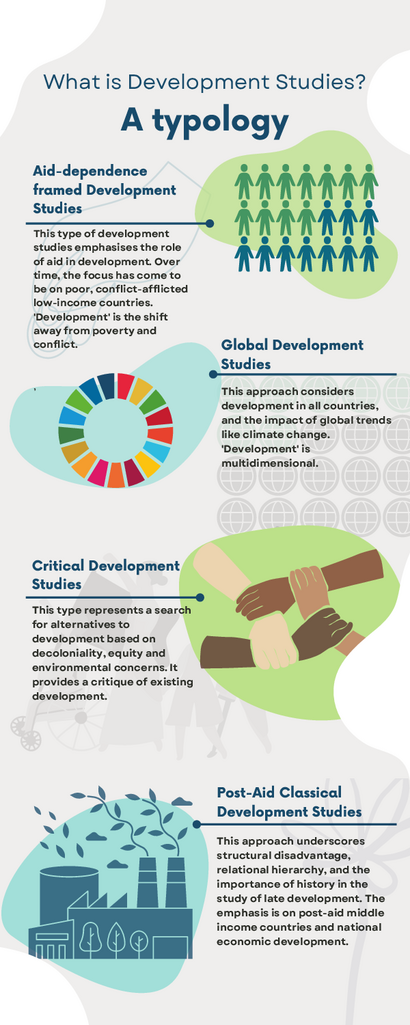Definition of Development Studies
Development Studies (also known as ‘international development studies’ or ‘international development’) is a multi- and inter-disciplinary field of study rather than a single discipline. It seeks to understand the interplay between social, economic, political, technological, ecological, cultural and gendered aspects of societal change at the local, national, regional and global levels. In a broad discussion process, EADI approved a definition of Development Studies in 2017. It serves as a reference for institutes starting new master programmes or adapting their programmes, and in our accreditation initiative IAC.
- Development Studies (also known as ‘international development studies’ or ‘international development’) is a multi- and inter-disciplinary field of study rather than a single discipline. It seeks to understand the interplay between social, economic, political, technological, ecological, cultural and gendered aspects of societal change at the local, national, regional and global levels.
- Development Studies, as an academic field of study, is also characterized by normative and policy concerns about inclusive and sustainable development. It aims to contribute to possible solutions to societal problems and is increasingly applied in focus and engaged with policy and practice.
- Development Studies is context sensitive. It examines societal change using historical, comparative and global perspectives. It aims to take into account the specificity of different societies in terms of history, ecology, institutions, culture, knowledge, technology, etc. It further examines how these differences can – and often should and do – translate into varied local responses to regional or global processes, and varied development strategies.
- Development studies is an evolving field of study, which covers an expanding range of concerns. Current concerns include poverty, inequality and exclusion, environmental sustainability and climate change, global governance; armed conflict and violence, urbanization, rural development, land tenure and agrarian change, migrations, health, education, labour, and gender equity. However, the range of concerns it addresses and the methods it uses evolves over time, as witnessed by an increasing interplay between social and ‘hard’ sciences and the emergence of novel concerns such as South-South cooperation, poverty and social exclusion in industrialized countries, technological innovation, and private sector actors in international development.
- Though policy and practice are the primary focus of Development Studies, there has never been a consensus on these matters, nor should there be. There are too many uncertainties and too much diversity in situations and objectives around the world to make this possible.
- Development Studies promotes and draws part of its strength from genuine partnerships and cross-fertilization between institutions and individuals anchored in different disciplines and traditions, and working in different parts of the world.
- As an academic, policy and practice oriented field, development studies draws on various disciplines and methods. In most cases, teaching programmes are multi-disciplinary and use mixed methods. In some cases, deepening students’ grasp of a single discipline is prioritized (for example, ‘development economics’), but accompanied by steps to enhance their ability to understand and use concepts and methods from other disciplines.
- Which disciplines and methods become the focus depends on the particular societal and policy issues considered and on the specialization followed within the field of development studies.
- At an epistemological level, development studies includes a variety of social inquiry approaches embedded in positivist, interpretative, historical and critical social research. Methodological approaches for development research can range from inductive methods grounded in the observation of field reality to deductive approaches that test theory-based models empirically, although positivist and quantitative approaches tend to be most influential.
- Education in development studies therefore needs to do the following:
- deepen and contextualize disciplinary understandings, while broadening such understandings with reference to other disciplines, epistemologies and methods (both qualitative and quantitative);
- investigate societal problems and innovations in a way that provides students with relevant analytical tools and theories, and a wide range of examples and perspectives showing how they can be applied in a context sensitive manner;
- give students a coherent specialization and enhance their methodological rigor;
- flexibly accommodate their particular needs and interests, given their academic and professional backgrounds and expected career paths;
- use pedagogical approaches that enable students to reflect on their own experience and to learn from each other’s diverse experiences and backgrounds.
- To deal with the complexities of development processes, graduates in development studies should be able to carry out policy and practice focused analyses and academic research on a range of topics, using appropriate conceptual frameworks. They must apply concepts and methods from relevant disciplines with scientific rigor.
- Graduates must be able to select and apply relevant methods for collecting, interpreting and assessing (qualitative and quantitative) information on development processes and their impacts, including knowledge and experience from a range of sources. They must be able to operate intelligently and ethically in situations of incomplete or inaccurate information.
- They must be able to communicate the results of their research and their methodology to audiences ranging from academics and policy makers to local communities and civil society organisations. They also need to consider how to engage these stakeholders in following up the research.




